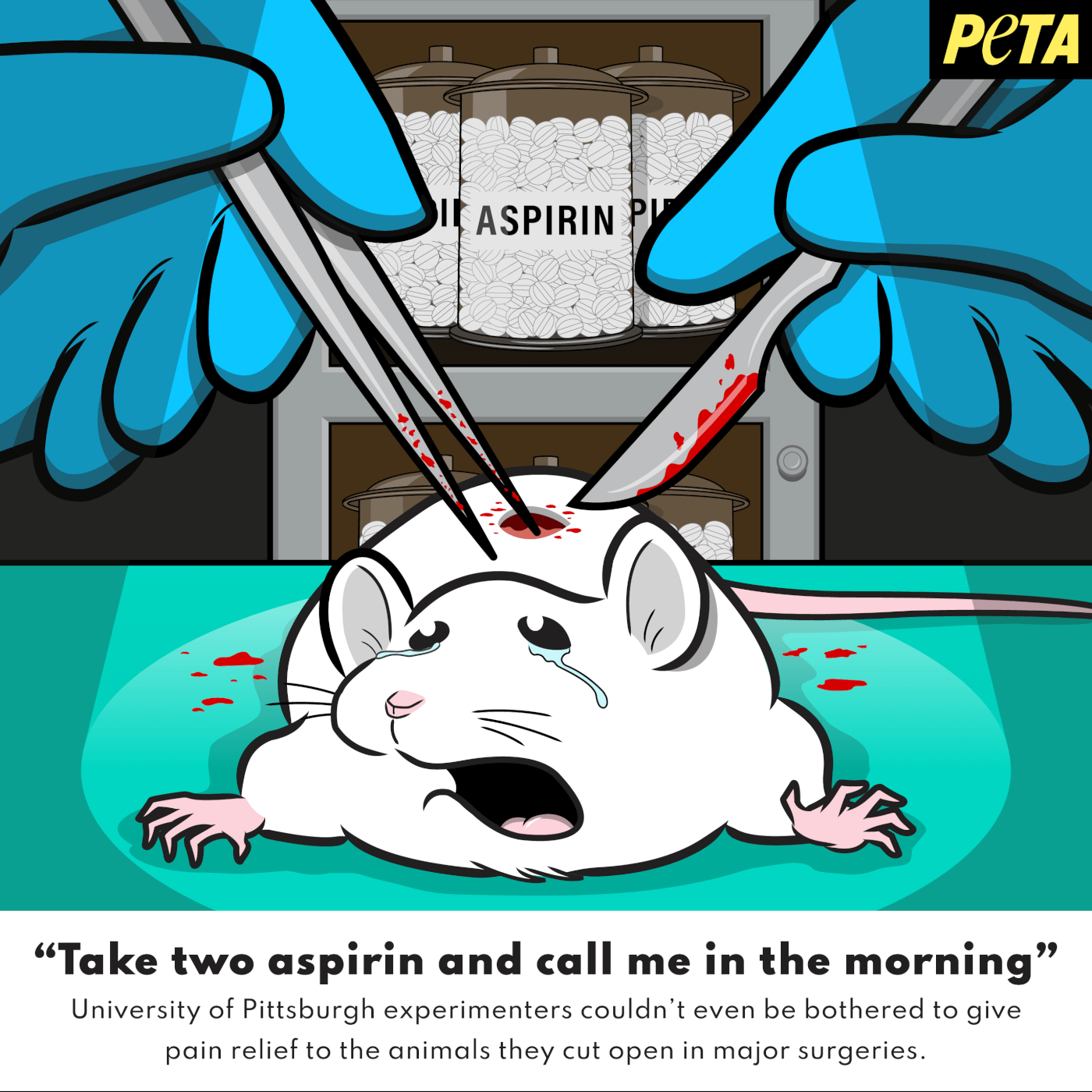Pitt Labs Go Rogue, Inject Mice’s Brains With Viruses in Unapproved Experiments
PETA has uncovered federal records that show an astounding 74 violations of animal welfare regulations in the University of Pittsburgh’s (Pitt) laboratories in the five years since our 2017 exposé. These violations run the gamut from material negligence to unapproved surgeries on live animals. We previously exposed that in Pitt’s labs, animals’ limbs were surgically bent into unnatural positions, they had wounds so deep that tendons were exposed, and experiments were designed to kill animals slowly and painfully. Five years later, animals continue to suffer at the university because of experimenters’ inattention, incompetence, and cruelty.
Cruel, Painful, and Dark Experiments
Experimenters performed painful, invasive procedures—such as tumor removal, lung transplants, and spinal cord surgeries—on over 100 pigs, mice, and rats who didn’t have adequate pain relief. These animals went through hell: Their sensitive tails were cut off, sections of their burned skin were removed, and pumps were implanted into their backs—but none of them received the required medications to ease their suffering.

Pitt experimenters also routinely performed horrific, rogue experiments with no approval:
- An experimenter injected a virus into the brains of three mice without approval. They were then killed, with no data collected.
- Lab workers removed tumors from and injected drugs into 15 live mice—procedures that were only approved post-mortem.
- An experimenter performed several unapproved surgeries, including a hind-limb transplant on a rat who hadn’t been given appropriate pain relief.
Pitt’s Labs Neglected Animals’ Basic Needs
In several cases, experimenters and laboratory staff couldn’t be bothered to provide animals with basic necessities such as food, water, light, or even oxygen. The labs’ recklessness and extreme negligence runs counter to the very science experimenters say they’re doing. Broken equipment, basic mistakes, and lack of consistent access to food, water, and other basic necessities caused the suffering and deaths of numerous animals. Since the labs received over $600 million from the National Institutes of Health in 2021 alone, it’s clear that money won’t solve the problems:
- The lights in a room full of mice failed during a holiday break, leaving the animals in total darkness for five days. No one checked on them the whole time.
- Pitt experimenters starved or dehydrated mice 25 different times, leaving over 50 dead, and countless others suffered from lack of food and water.
- Twelve rats suffocated to death because experimenters didn’t notice that an oxygen deprivation chamber was malfunctioning.
- Eleven frogs developed severe leg infections and died because they didn’t receive fresh water in their tanks for two days. The water in one tank dried up completely.
- Pitt experimenters threw rats, mice, and their babies into carcass bags or coolers at least six times while they were still alive. In one case, seven baby mice were discarded and found alive in a bag with several dead adult mice.
- Two monkeys were strangled when the chain collars that experimenters affixed around their necks to move them from the lab’s restraining chairs become entangled. One died, and the other was bruised and injured.
- Workers failed to protect a marmoset from broken lab equipment, which pierced his mouth and broke his jaw, no doubt causing severe pain.
- Experimenters latched a marmoset’s cage incorrectly, causing a catastrophic hand injury that required two of his fingers to be amputated.
- Experimenters let a rabbit fall out of a cage onto the hard floor, bruising his lip.
- On three separate occasions, staff let a room get so cold that several mice and rats froze to death and a litter of mouse pups were cannibalized by their mother, likely due to cold stress.
The repeat nature of so many of these horrible incidents makes it clear that Pitt should never be looking after animals.
Demand Real Consequences From Pitt Labs
Pitt’s labs have failed to prevent the worst and most basic mistakes. Experimenter Ivona Pandrea, a repeat offender in terms of safety and welfare issues, was only temporarily suspended after racking up several serious violations. She made four monkeys severely anemic by overdrawing their blood. She also failed to monitor monkeys as required and didn’t provide treatments or nutritional support. This occurred after she had been cited for moving six monkeys with simian immunodeficiency virus to a room without telling anyone else that it had become a biohazard area.
This kind of a slap on the wrist is typical for Pitt. Its disgusting, speciesist disregard for animals in laboratories needs to end. We’re calling on its labs to fire rogue experimenters, permanently prohibit their access to animals, and modernize their barbaric science.
The university should modernize its laboratories and adopt PETA scientists’ Research Modernization Deal (RMD)—a strategy for replacing animal experiments with modern, human-relevant, and animal-free research methods.

